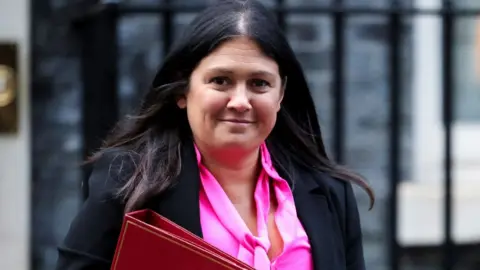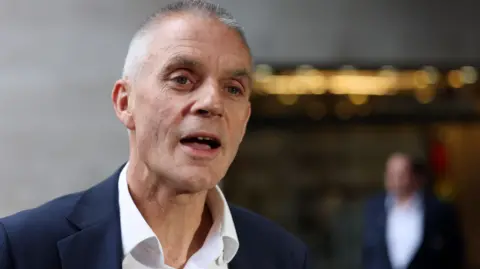‘Real concern’ about political appointees on BBC board, Nandy says
60 minutes agoSteven McIntoshEntertainment reporter

 Reuters
ReutersCulture Secretary Lisa Nandy has said she shares a “real concern” that political appointments to the BBC board damage trust in the corporation.
The make-up of the board has come under fresh scrutiny this week following the resignation of director general Tim Davie, after a leaked memo raised editorial concerns including the way Panorama edited a speech by President Trump.
Nandy told BBC Radio 4’s Today the perception of political influence is “a problem”, adding she would be examining the issue as part of the corporation’s next charter review.
The culture secretary also indicated that a string of recent scandals at the BBC suggested the corporation should have “people at a very senior level with a journalistic background”.
Political appointments to the board would be examined in the charter review, she said in response to a question asking if member Sir Robbie Gibb, a former communications director under Conservative prime minister Theresa May, had overstepped his remit and weighed into politics.
The Charter sets the funding and regulatory duties of the BBC and is negotiated with the government.
Davie resigned from the corporation on Sunday, along with CEO of News Deborah Turness, after a memo raising concern about editorial decisions and perceived institutional bias was leaked to the Daily Telegraph.
On Thursday, the BBC apologised to President Trump for a Panorama episode that spliced parts of his 6 January 2021 speech together, but rejected his demands for compensation.
The corporation said the edit had given “the mistaken impression that President Trump had made a direct call for violent action” and said it would not show the 2024 programme again.
Lawyers for Trump have threatened to sue the BBC for $1bn (£759m) in damages unless the corporation issues a retraction, apologises and compensates him.
A week of damaging headlines has followed, with some media commentators putting the spotlight on Sir Gibb.
Nandy acknowledged that the “sheer number of questions” she had received about Sir Robbie in the House of Commons earlier this week suggested “there is a real concern, which I share, that political appointments to the board of the BBC damaged confidence and trust in the BBC’s impartiality”.
“That is something we will be looking at as part of the charter review.”
Asked by presenter Nick Robinson about Sir Robbie’s current role on the board, Nandy said he was appointed by the previous government, and would remain in post until 2028.
The current charter states that board members would have to be “unwilling, unfit or unable to discharge their duties” in order to justify their removal, she said, adding: “In these particular issues instances I’m unable to act.”
Creative industries union Bectu has demanded the removal of Sir Robbie Gibb from the BBC board in a letter the the culture secretary and BBC chair Samir Shah. The union said Sir Robbie’s position was “a distraction and is untenable”.
“We simply do not see how staff can have faith in the BBC’s leadership while a crucial position on the board is filled by someone perceived by many staff and external commentators as sympathetic to, or actively part of, a campaign to undermine the BBC and influence its political impartiality,” the letter said.
However, other commentators this week have drawn attention to the BBC’s appointment of Labour figures over the years, which have not attracted as much criticism.
Former BBC presenter Andrew Neil highlighted figures such as James Purnell, a former Labour MP who went on to a senior BBC role, Labour party donor Gavyn Davies who chaired the board of governors, Labour council leader Michael Lyons who chaired the BBC Trust, and former director general Greg Dyke, who was a Labour donor.

 EPA
EPADavie’s resignation came after a string of BBC scandals this year. As well as Panorma, the corporation has faced negative headlines about Strictly Come Dancing, MasterChef presenter Gregg Wallace, two Gaza documentaries, and Bob Vylan’s performance at Glastonbury.
Some have suggested the priority for choosing the next director general should be a strong editorial background to help better grasp similar scandals in the future.
Nandy said she would not tell the BBC what to do when it came to appointing the next director general, but she added there is an “emerging thread through many of the challenges the BBC has had”.
“That thread is that the editorial standards and guidelines that the BBC has are in some cases not robust enough and in other cases not consistently applied which leaves individual journalists, presenters and editors in quite a difficult position on a number of occasions,” she said.
“I think that does demand that there are people at a very senior level with a journalistic background who are able to uphold those standards.”
Discussing President Trump’s threat to sue following the fallout over Panorama’s speech, Nandy told BBC Breakfast: “The BBC is independent of government, and so they are having those direct discussions with the US administration and with their own lawyers.
“But they have been speaking daily to the director, the chair of the board, the director general, and other senior leadership within the BBC. And I am confident that they’re gripping this with the seriousness that it demands.”